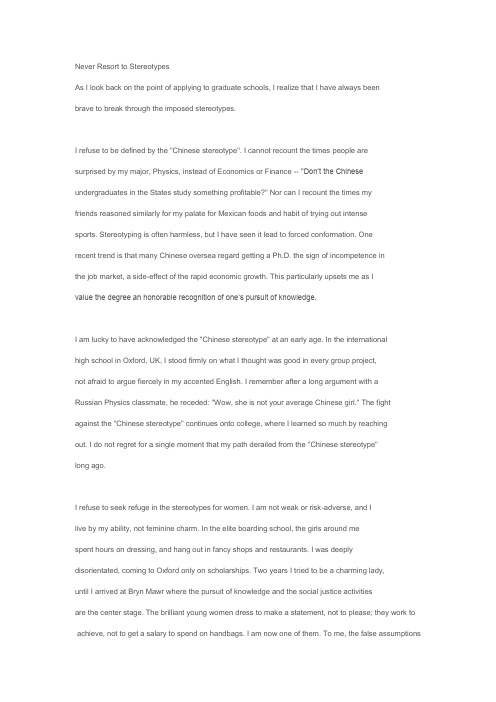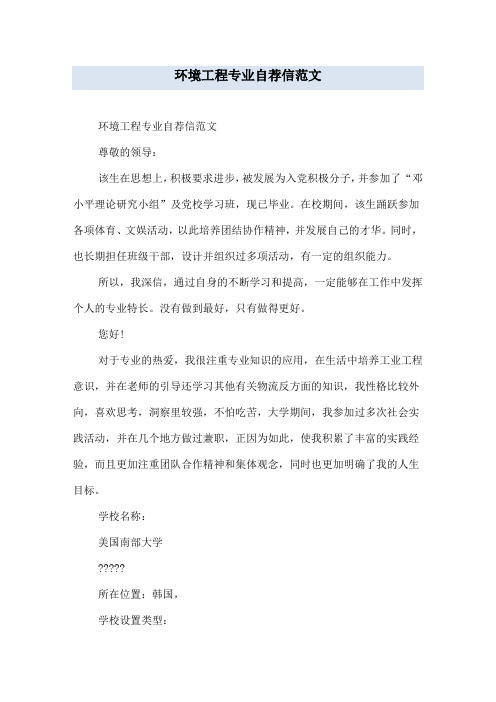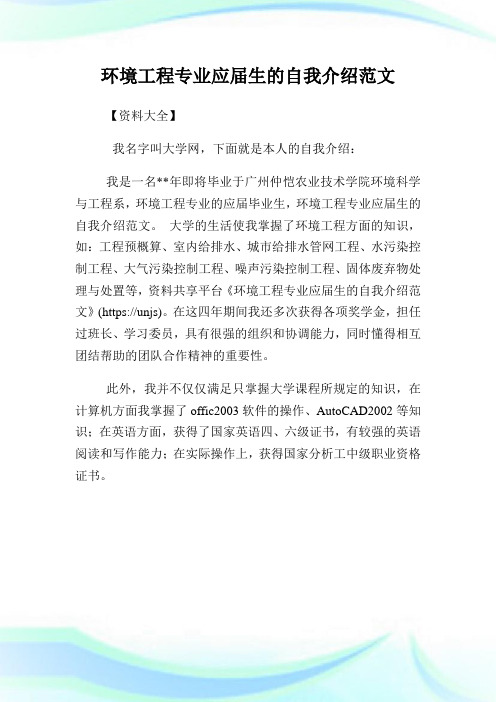哥伦比亚大学--环境工程-个人陈述范例
- 格式:docx
- 大小:17.65 KB
- 文档页数:3

环境工程专业英语自我介绍的范文Environmental Engineering Self-Introduction.Good day, everyone. It's a pleasure to have this opportunity to introduce myself to you all. My name is [Your Name], and I have a profound passion for the field of environmental engineering.My journey into this fascinating discipline began during my undergraduate studies, where I majored in Environmental Science and Engineering. It was during this time that I developed a keen interest in understanding how we can harness technological advancements to mitigate the environmental impacts of human activities. The courses I took, ranging from water and wastewater treatment to solid waste management and air pollution control, not only broadened my knowledge base but also sparked a desire to contribute to the sustainable development of our planet.One of the most significant projects I was involved induring my undergraduate studies was a research collaboration with a local municipality on the design and implementation of a waste-to-energy plant. This project provided me with hands-on experience in the entire lifecycle of an environmental engineering project, from initial feasibility studies to final commissioning. It was a challenging yet rewarding experience, as I.。

英国留学工程学专业个人陈述案例引言我是一名来自中国的工程学专业学生,对于英国留学工程学专业有着浓厚的兴趣。
本文旨在介绍我个人的背景、学术成就和职业目标,以及为什么选择英国作为留学目的地。
教育背景我在中国的一所著名大学攻读工程学专业学士学位。
在本科期间,我研究了广泛的工程学科知识,包括机械工程、电气工程和土木工程等。
我通过实践项目和实机会,积累了丰富的实际工程经验,并取得了优秀的学术成绩。
学术成就在本科期间,我在学术方面取得了一些重要成就。
我在工程学领域的课程中表现出色,并获得了多个学术奖项。
我也参与了一些研究项目,发表了几篇与工程学相关的论文。
这些经历不仅增强了我的学术能力,也培养了我的团队合作和研究能力。
职业目标我选择留学工程学专业的主要原因是我对工程学的热爱和追求。
我希望通过深入研究和研究,提升自己在工程领域的专业知识和技能。
我希望将来能够成为一名优秀的工程师,为社会做出贡献。
选择英国留学的理由英国作为世界上顶尖的教育中心之一,拥有许多优秀的工程学院和研究机构。
我相信在英国的留学经历将为我提供丰富的学术资源和专业指导,帮助我更好地发展自己的工程技能。
此外,英国的教育体系注重理论与实践的结合,这与我在本科期间的研究经历相契合。
结论我希望通过留学工程学专业,进一步提升自己的学术水平和专业能力。
我相信英国作为留学目的地将为我提供最佳的研究环境和机会。
我热切期待在英国的留学生活,并将努力实现我的职业目标。
---(以上内容为个人陈述案例的框架示例,具体内容可根据个人情况进行修改和补充。
)。

Never Resort to StereotypesAs I look back on the point of applying to graduate schools, I realize that I have always beenbrave to break through the imposed stereotypes.I refuse to be defined by the "Chinese stereotype". I cannot recount the times people aresurprised by my major, Physics, instead of Economics or Finance -- "Don’t the Chinese undergraduates in the States study something profitable?" Nor can I recount the times myfriends reasoned similarly for my palate for Mexican foods and habit of trying out intensesports. Stereotyping is often harmless, but I have seen it lead to forced conformation. Onerecent trend is that many Chinese oversea regard getting a Ph.D. the sign of incompetence inthe job market, a side-effect of the rapid economic growth. This particularly upsets me as Ivalue the degree an honorable recognition of one’s pursuit of knowledge.I am lucky to have acknowledged the "Chinese stereotype" at an early age. In the internationalhigh school in Oxford, UK, I stood firmly on what I thought was good in every group project,not afraid to argue fiercely in my accented English. I remember after a long argument with aRussian Physics classmate, he receded: "Wow, she is not your average Chinese girl." The fightagainst the "Chinese stereotype" continues onto college, where I learned so much by reachingout. I do not regret for a single moment that my path derailed from the "Chinese stereotype"long ago.I refuse to seek refuge in the stereotypes for women. I am not weak or risk-adverse, and Ilive by my ability, not feminine charm. In the elite boarding school, the girls around mespent hours on dressing, and hang out in fancy shops and restaurants. I was deeplydisorientated, coming to Oxford only on scholarships. Two years I tried to be a charming lady,until I arrived at Bryn Mawr where the pursuit of knowledge and the social justice activitiesare the center stage. The brilliant young women dress to make a statement, not to please; they work to achieve, not to get a salary to spend on handbags. I am now one of them. To me, the false assumptionsabout women are not something I would quote if I fail to perform -- I strive to prove that the stereotypes for women are incomplete.I refuse to be put into "boxes" according to my primary academic field, because I and myfuture are much more than just a Physics student. While I dedicate hours to my Physicsresearch and the difficult problem sets every day, I also try to balance the work within mymajor and broader interests. In fact, this is what led me to applying to EnvironmentalEngineering, the very first of such transition in the history of Physics Department atHaverford. It is not an easy transition, but I have followed where my ambition leads me, bydoing relevant research, internships, coursework and contacting faculty, and maintaining good performance in my major. The courage to learn outside the "box" is important in theinterdisciplinary research collaboration. So far I have demonstrated my potential to work indifferent scientific disciplines.I refuse to let stereotyping diminish the future of potential scientists. During my scienceteaching internship at a public high school, seeing some bright kids distracted in a chaoticscience classroom, I tried to lure them into thi nking about Newton’s First Law through the experiments, and we ended up having a great conversation on why Physics is fun. Yet these kids may end their day by watching their new-born babies, or earning cash from part-time jobs. I feel regretful that I got away by fighting against stereotypes, and they did not. It has also recently dawned on me, by joining the Earth Science Women’s Network, that subjectivestereotyping still has not fully exited the academia. As I advance in my career, I will keepencouraging myself and others to break the boundaries, no matter how strong conventionresists.。

环境工程专业申博英文自我介绍English: As a candidate with a strong passion for environmental engineering, I am thrilled to introduce myself to you. My interest in environmental protection and sustainable development led me to pursue a Bachelor's degree in Environmental Engineering, where I gained a solid foundation in the principles and practices of environmental science, water and wastewater treatment, air pollution control, and environmental impact assessment. During my undergraduate studies, I actively participated in various research projects and internships, where I developed hands-on experience in environmental monitoring, pollution prevention, and remediation technologies. I also engaged in community outreach programs and volunteer activities, which deepened my understanding of the real-world challenges in environmental management. With a strong belief in the importance of addressing global environmental issues, I am eager to further my knowledge and skills in the field of environmental engineering through a graduate program, where I aim to contribute to the development of innovative and sustainable solutions for environmental problems.中文翻译: 作为一名对环境工程充满热情的申请者,我非常高兴向您介绍自己。

环境工程专业自荐信范文环境工程专业自荐信范文尊敬的领导:该生在思想上,积极要求进步,被发展为入党积极分子,并参加了“邓小平理论研究小组”及党校学习班,现已毕业。
在校期间,该生踊跃参加各项体育、文娱活动,以此培养团结协作精神,并发展自己的才华。
同时,也长期担任班级干部,设计并组织过多项活动,有一定的组织能力。
所以,我深信,通过自身的不断学习和提高,一定能够在工作中发挥个人的专业特长。
没有做到最好,只有做得更好。
您好!对于专业的热爱,我很注重专业知识的应用,在生活中培养工业工程意识,并在老师的引导还学习其他有关物流反方面的知识,我性格比较外向,喜欢思考,洞察里较强,不怕吃苦,大学期间,我参加过多次社会实践活动,并在几个地方做过兼职,正因为如此,使我积累了丰富的实践经验,而且更加注重团队合作精神和集体观念,同时也更加明确了我的人生目标。
学校名称:美国南部大学?????所在位置:韩国,学校设置类型:创建时间:1990年学历:本科研究生学校性质:学生人数:0人院校地址:很冒昧占用您宝贵的时间,感谢您在百忙之中读完我的自荐信。
我是一名来自XX学院环境工程专业20XX届的应届本科毕业生,在将要结束大学生活,掀开人生新的一页之时,我怀着无比激动的心情向您毛遂自荐,接受您的挑选与考验。
在大学三年里,时刻按照“宽专业、厚基础、强能力、高素质”标准去锻炼及发展自我,在不断的学习和实践中提高了自己的综合素质,已把自己塑造成为一个专业功底扎实、知识结构完善、适应能力强、富于协作精神的时代青年。
我相信未来社会需要的是高素质的复合型人才,成功的学习者在充分的认识到书的价值的同时,也应认识到书的无价值。
因而我在学习之外,积极参加了各种各样的课余活动,如“计算机协会”、“数学建模”等。
所有这些活动都有利于我提高自身的计算机操作能力和团体协作能力。
20xx年下半学期在XXXX中学教育实习一个多月,在教学和班主任工作两个方面得到较好的锻炼,掌握了教学各个环节的基本要求和方法,了解了班主任工作的主要内容及其意义,具备了独立从事教学工作和班主任工作的能力。

环境工程专业应届生的自我介绍范文
【资料大全】
我名字叫大学网,下面就是本人的自我介绍:
我是一名**年即将毕业于广州仲恺农业技术学院环境科学与工程系,环境工程专业的应届毕业生,环境工程专业应届生的自我介绍范文。
大学的生活使我掌握了环境工程方面的知识,如:工程预概算、室内给排水、城市给排水管网工程、水污染控制工程、大气污染控制工程、噪声污染控制工程、固体废弃物处理与处置等,资料共享平台《环境工程专业应届生的自我介绍范文》(https://unjs)。
在这四年期间我还多次获得各项奖学金,担任过班长、学习委员,具有很强的组织和协调能力,同时懂得相互团结帮助的团队合作精神的重要性。
此外,我并不仅仅满足只掌握大学课程所规定的知识,在计算机方面我掌握了offic2003软件的操作、AutoCAD2002等知识;在英语方面,获得了国家英语四、六级证书,有较强的英语阅读和写作能力;在实际操作上,获得国家分析工中级职业资格证书。
环境工程专业自我介绍范文在校期间我努力学习相关的专业长知识,积极进取,在各方面都严格要求自己,使自身能力不断提高以便适应社会需求。
放假期间,我积极参加社会实践实习,在各方面得到了更大的提高,因为只有把所学知识应用到实际工作中,服务于社会,才能真正体现自身的价值,磨炼自身。
我是有积极向上、踏实肯干、知难而上的优良品质。
在这个人才济济、竟争激烈的新时代,虽然我不是最优秀的,但我决不轻视自己;我是平凡社会中的一员,但我决不平庸,也不甘平庸。
一个人只有不断的培养自身能力、提高专业素质、拓展内在潜能,才能更好的完善自己,充实自己,更好的服务于社会,不是所的事都靠聪明才能完成的;成功更青睐于勤奋执着的人、实事求是的人。
我本着以发挥自身的特长,在实习中虚心向同事请教,从而不断使自己学习和进步。
也许在众多的求职人员中,我不是最好的,但我可能是最适合的。
自强不息是我的追求,希望您能给予我一次机会,我会尽职尽责,努力做好本职工作,让您让单位满意,相信我没错的!环境工程专业自我介绍范文(2)尊敬的贵校招生老师:您好!非常荣幸能有机会向贵校介绍我自己。
我是XX,即将从XX大学环境工程专业毕业。
感谢您在百忙之中阅读我的自我介绍。
作为一名环境工程专业的学生,我一直对环境保护和可持续发展的问题充满热情。
我对环境问题的关注以及对环境保护的认同是我选择环境工程专业的主要原因之一。
同时,我也坚信环境工程专业能够为我提供更多的知识和技能,让我能够为社会贡献自己的力量。
在大学四年的学习生涯中,我积极参加各种与环境工程相关的科研和实践活动,并付出了努力和汗水。
在学习方面,我始终保持着良好的学习状态和学习态度,在各门课程中取得了优秀的成绩。
并且,我还利用空余时间自学了一些与环境工程相关的知识,拓宽了自己的眼界。
在科研方面,我曾参与导师的科研项目,通过实际操作和数据分析,深入了解了环境问题的复杂性和解决方法的多样性。
在实践方面,我参加了社会实践活动和大学生创新创业项目,提高了自己的动手实践能力和团队协作能力。
2024年环境工程专业自我介绍范文尊敬的评委老师们:大家好!我叫XXX,来自XXX大学环境工程专业,非常荣幸能有机会在今天给大家做一个关于自己的介绍。
一、年少的决定回顾起自己选择环境工程专业的过程,我觉得它是一个凝聚着我对环境保护的热爱和责任感的选择。
小时候,身边的城市化带给我们许多便利,可同时也带来了严重的环境污染。
我常常对着黄褐色的天空和臭气熏天的河流感到焦虑和无奈。
于是,我下定决心要为环境奉献出自己的力量,让我们的家园变得更加清洁和美丽。
二、专业的选择进入大学之后,我开始系统地学习与环境相关的知识,了解到环境工程专业能够全面深入地研究和解决环境问题。
于是,我毫不犹豫地选择了环境工程专业。
在专业课程中,我学习了环境科学、环境化学、废水处理、大气污染控制等课程,通过课内外的实践活动,我了解到环境工程技术可以通过处理、净化和回收利用来改善环境污染,同时也培养了我解决环境问题的能力和责任感。
三、实践经历在大学期间,我积极参与了各种实践活动,以提高自己的综合素质和实践能力。
我参与了环境保护论坛和研讨会,了解到了关于环境保护的前沿技术和政策,同时也与专业人士进行了交流。
此外,我还参与了校内的环境保护项目,包括土壤污染修复、废水处理、空气质量监测等。
通过这些实践经历,我不仅将学到的理论知识应用到实际工作中,还培养了团队合作和问题解决的能力。
四、自我提升为了不断提升自己的专业能力,我积极参加了国内外环境工程的学术会议和培训班。
在这些活动中,我与各界专家、学者和同行进行了深入的交流和学习,激发了我的求知欲和创新思维。
同时,亲身参与了一些科研项目,独立完成了一些实验和数据分析,拓宽了我的视野和研究能力。
五、未来的展望作为一个环境工程专业的学生,我深感责任重大。
我希望通过自己的努力,为改善环境贡献自己的力量。
我愿意投身于环境保护工作中,利用所学的知识和技能解决实际的环境问题。
同时,我也希望能够不断提升自己的专业能力,成为一名优秀的环境工程师,出色地完成各项任务。
环保硕士个人陈述尊敬的招生委员会:您好!我谨借此机会向您呈上我的个人陈述,向您表达我申请贵校环保硕士项目的诚挚愿望。
在我国,环保事业正处于关键时期,我坚信,作为一名热衷于环保事业的青年,我有责任也有能力为我国的环保事业贡献自己的力量。
以下,我将简要介绍我的个人背景、学术经历、兴趣爱好以及职业规划,以便您更好地了解我。
一、个人背景我出生在我国一个美丽的沿海城市,从小就在父母的熏陶下,培养了热爱大自然、关注环保的良好习惯。
在我国,环保事业的发展还相对滞后,环境污染问题严重,这使我深感忧虑。
高中时期,我加入了学校环保社团,开始系统地学习环保知识,参与各种环保实践活动,如环保宣传、植树造林、调研水质等。
这些经历让我对环保有了更深入的认识,也使我坚定了从事环保事业的决心。
二、学术经历在大学期间,我主修环境科学专业,全面学习了环境化学、生态学、环境监测、环境影响评价等课程。
通过专业学习,我掌握了环保领域的基本理论知识,了解了我国环保政策及环保产业发展状况。
我还积极参加各类学术竞赛和实践项目,不断提升自己的专业素养。
大学期间,我曾获得校级优秀团员、优秀毕业生等荣誉称号。
三、兴趣爱好除了专业学习,我还热衷于参加各种社会实践和志愿活动。
在大一时,我加入了志愿者协会,参与了支教、扶贫、环保等公益活动。
这些经历使我更加关注社会问题,培养了我的团队协作能力和组织沟通能力。
我还热爱运动,尤其喜欢跑步和骑行。
这些户外运动让我更加亲近大自然,也使我更加坚定地投身环保事业。
四、职业规划作为一名环保专业的学生,我深知自己肩负的责任和使命。
在未来的职业生涯中,我希望建立在扎实的专业基础上,不断提高自己的综合素质,为我国的环保事业贡献自己的力量。
具体而言,我希望在硕士阶段,通过系统地学习环保相关理论知识,进一步拓宽视野,提升自己的专业素养。
我还希望积极参与课题研究,为解决实际环保问题提供科学依据。
在毕业后,我希望进入环保部门或相关企业,将所学知识运用到实际工作中,为改善我国环境质量、推动环保事业发展贡献力量。
哥伦比亚大学的录取过程个人陈述要客观很多申请者都很想了解哥伦比亚大学的录取过程,今天我们就来看看哥伦比亚大学的招生官员对于个人陈述是如何要求的吧。
哥伦比亚大学(Columbia University)位于美国纽约市曼哈顿,于1754年根据英国国王乔治二世颁布的《国王宪章》而成立,属于私立的常春藤盟校,Graduate School of BusinessAssociate Dean for Admissions and Administration哥伦比亚大学的录取过程既是主观的,同时又是对申请人的客观评价。
由于我们在选择那些可能真正成为商务领导的人才,在招生录取过程中,我们既考察学生的大学成绩和GMAT成绩,也考虑他们的人际交往能力,工作经验和个人品质。
所以,怎样全面地倾销自己是非常重要的。
我们还将增加口试机会,这些都会有助于我们评估申请人能否在我们学校和商界获得成功。
在申请哥伦比亚的个人陈述中,我们最感爱好的是申请人毕业后的目标和打算,及其与个人经历之间的关系。
我们十分注重其过往的工作经验,比如他们曾经带领别人做成了某件事情,或可以证实其领导潜质。
申请人能否与别人协同工作也是我们非常留意的,由于在此学习需要你与其他人密切合作,参与团体项目,要获取成功你必须与他人良好合作。
我们对申请人对哥伦比亚大学的爱好和了解也感爱好,由于这所大学地处繁华的纽约市,申请人未来的学习会与这个国际大都市牢牢相连。
我们想找那些可以在这种布满刺激和多样性的环境中成功的人。
我们的学生群体十分复杂,十分国际化。
约25%-30%的学生来自国外。
我们的本国申请人也日益国际化,由于他们当中的很多人生在国外,也有很多人在国外旅行和工作。
所以假如一个申请人只呆在一种单一环境下而从未在国外旅行,做项目,那他是不适合哥伦比亚大学的。
我们青睐那些乐于通过任何机会学习外国文化,和其他待人处世方法的申请人。
因此,申请人以前在国外的广泛阅历和国际合作能力是非常重要的因素。
第一篇是哥伦比亚的个人陈述。
The tap water I drank for two years in England holds a hint of chlorine, nevertheless, drinkable; its Swiss counterpart, crystal-clear and tastes divine. I have inhaled voraciously the air in Pullman, Washington, along with its scent of ripening wheat and temperate forests. I have swum into the Mediterranean Sea straight from the Barcelonata beach ten minutes away from downtown Barcelona. All the while travelling and studying aboard, I think about my home, China, about how none of these things can be done there. And the thought pains me.Becoming an Environmental Engineer is not a mere whim resulted from my concerns for China’s pollution – it became a determination, when I spent a fruitful summer at Washington State University as a research student in Laboratory for Atmospheric Research. Under the guidance of Professor Serena Chung, Professor Brian Lamb and a doctoral student Rodrigo Gonzalez-Abraham, I conducted an analysis on the effect of wildfire atmospheric emissions on regional air quality, using the current and future year simulations output by the WRF-SMOKE-CMAQ modeling framework. I discovered that wildfires account mainly for the particulate matters in the air, and that the increase in the precipitation in the future is likely to be responsible for a 60%-80% decrease in particulate matter’s concentrations. Not only have I improved my programming skill, data processing skill and the ability to approach a task through my project, but also gained knowledge in the field of air monitoring and control through a series of “crash courses” equivalent to classes that an Environmental Engineering undergraduate would take. I become enticed by the complexity and the interdisciplinarity of environmental modeling, and reaffirmed Environmental Engineering as my career path. At the time when several faculty members from the department were leaving for Tianjin, China for a project, and joked about the possibility of their accurate measuringequipments malfunctioning when operating in the megacity plagued by pollution, my heart sank, and instantly I knew that my best career option is to help converting the terrible situation.As a Physics major and a Math minor, I make more efforts than a summer research to edge my way into Environmental Engineering. For senior year, I am taking a course entitled Water Quality and another one on Environmental Systems at Swarthmore College. In the former, I will work on a group project that aims to improve the pollution model of a local creek, developed by Professor AuthurMcGarity using Storm Water Management Model. If my schedule allows, the summer after my graduation will include taking basic engineering summer courses in preparation for graduate school. In addition, Iwill be spending my fall break this year working at California Air Resources Board and learning how research results influence public policy making. In my one-month winter break, I will intern in the Bio-fuel research sector at the ENN Company, a Chinese energy company that plays a leading role in the development of oil extraction from algae cultures.It took me a while to figure out that I want to use my specialty in the real world as an engineer. This is mainly because I am also fascinated with theories and abstract concepts that Physics and Mathematics offer. Immersed in the atmosphere of a liberal arts college, I embrace the idea that a kid should study what fascinates him/her the most in college. Armed with enthusiasm, I did a month-long Theoretical Physics research during the summer of freshman year, on the question of whether our universe has a “preferred” handedness and whether it is detectable in the large-angle anisotropy of Cosmic Background Radiation. As it turns out, it takes more than a month for a freshman to tackle Theoretical Physics, for I spent most of the time teaching myself General Relativity through a thick textbook written by John Wheeler, instead of doing anything remotely original. While I enjoy leaving the research with a mindful of abstract ideas about the origin of the universe, I settled with myself on the contention of whether to pursue pure theories throughout my life.The decision is no. As a result, my second research in Physics, the one started in the fall of 2009 and evolves into my senior project, differs significantly from the first one. The project in the Non-linear Physics Lab at Haverford College looks at the behaviors of swimming microorganisms in a quasi-2D fluid. The project was especially challenging at the beginning, because of the universally known fact that you cannot let a Physicist take care of living organisms. I had to figure out a systematic procedure to culture algae cells, to keep them motile, to add fluorescent tracers without disturbing their normal metabolism, and to take accurate measurements. Looking back at those days, I realized that the most valuable lesson I have learned is neither the lab procedures nor the modeling skill, but an effective approach to a new project and the step-by-step elimination of experimental difficulties. This was also a time during which I encountered frustrations and joys down the path of an objective research, and tried to handle them professionally. They say doing research is about how you do it, not what you do. And I hope to incorporate my Physics research experiences and perspectives into the future research in Environmental Engineering.As my transcript indicates, I intend to finish my undergraduate in three years. Although Bryn Mawr and Haverford equip me with a broad spectrum ofknowledge in Math, Physics, Economics and Art History, the absence of an Engineering department results in my eagerness to move on to a comprehensive university with more Engineering resources and peers, a university like Columbia.It is impossible not to be impressed by the Carbon Sequestration research going on in Columbia for someone like me who reads every issue of Scientific American. Although I may lack the knowledge in Engineering Design, I am confident to enter this new field under the guidance of Professor Klaus Lackner; more importantly, I have already developed a strong passion for Carbon Sequestration through reading various literatures. Also, Professor UpmanuLall’s specialty appeals to me because of his projects related tohydro-climate modeling and policy-making tools. Having visited SEAS and the department twice, I fell in love with the department’s friendly atmosphere and its “international flavor”. I would like to believe that I will be an asset to the department in return. My education background spans from China, Oxford to Philadelphia; from fifty kids per classroom in middle school, ten teenagers from five different countries per classroom in high school, to twenty brilliant young women and no men per classroom in college (see resume). I find equally great pleasure in two seemingly contrary activities: scientific research and philanthropy. It is my career goal to become a world citizen who, on one hand, savors the withdrawal of research, and on the other hand, advocates for a better environment when not at the desk. I am to be an Environmental Engineer, for my own pleasure, for the sake of my homeland, and for the sake of this globe we are all living in. And Columbia holds the same belief.。